|
|
|
|
|
|
|
|
Matchpoints Seminar, November 12-13, 2015 (Aarhus, Denmark). The purpose of the conference is to provide a forum for policy-makers and academics to deliberate on how the security, resilience and sustainability of the globalized Arctic region and its peoples may be enhanced, and what instruments of governance may most suitably contribute. The conference will spell out (1) how the different relevant dimensions of security (military, economic, environmental, energy and human security) manifest themselves in the governing / governance arrangements in the Arctic; (2) how the challenges associated with each manifest themselves, individually and together; and (3) what forms of governing arrangements can best help to address the challenges. The conference will also focus on (4) how the Nordic countries and nations, including Greenland, the Faroe Islands and Aaland Islands, may contribute to the peace, stability and prosperity of the Arctic region through collaborative efforts based on their shared social, human, environmental and democratic values.
Arctic Circle Forum (ACF) Singapore, November 12, 2015 (Singapore). The event will be hosted by The Arctic Circle and Singapore Maritime Institute (SMI), with the support of the Singapore Government. The ACF Singapore will be opened by President of Iceland Ólafur Ragner Grímsson and Deputy Prime Minister and Coordinating Minister for National Security of Singapore Teo Chee Hean. Discussions will focus on a range of topics related to Arctic shipping, infrastructure financing, ocean science and research, as well as global collaboration on Arctic affairs. Among the speakers and participants will be Senior Arctic Officials, representatives of major shipping companies, investment funds, and scientific institutes from the United States, Europe, and a number of Asian states.
Today's Congressional Action:
The House is not in session. The Senate is expected to consider military construction and veterans affairs appropriations as well as the national defense authorization act.
|
Feds Launch Environmental Review for Third Development Proposal at Offshore Liberty Field. For the third time since the late 1990s, federal regulators have embarked on an environmental review of an oil field that has languished off Alaska's northern coast without development. The Liberty field, which targets an oil reservoir initially discovered in the 1980s, has a new operator and a new development plan -- replacing two previous plans that won regulatory approval but were never carried out because of various economic and technical problems. Alaska Dispatch News
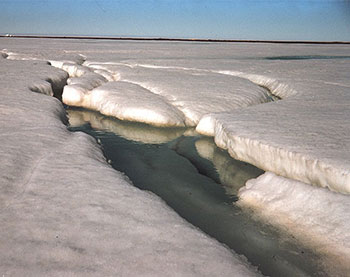 The Melting Arctic is Like 'Discovering a New Africa.' Governments and the private sector are positioning to develop the Arctic, where the wealth of resources is akin to a "new Africa," according to Iceland's president. The melting of the Arctic is an ongoing phenomenon: In October, about 7.7 million square kilometers (about 3 million square miles) of Arctic sea ice remained, around 1.2 million square kilometers less than the average from 1981-2010, according to calculations by Arctic Sea Ice News & Analysis that was published by researchers at the National Snow and Ice Data Center. One effect of the melting ice has been newly opened sea passages and fresh access to resources. CNBC The Melting Arctic is Like 'Discovering a New Africa.' Governments and the private sector are positioning to develop the Arctic, where the wealth of resources is akin to a "new Africa," according to Iceland's president. The melting of the Arctic is an ongoing phenomenon: In October, about 7.7 million square kilometers (about 3 million square miles) of Arctic sea ice remained, around 1.2 million square kilometers less than the average from 1981-2010, according to calculations by Arctic Sea Ice News & Analysis that was published by researchers at the National Snow and Ice Data Center. One effect of the melting ice has been newly opened sea passages and fresh access to resources. CNBC
Federal Scientists Eager to Share Their Research Now That Muzzles Are Off. It used to be that if you wanted to talk to a federal scientist who was monitoring salmon stocks in B.C. or studying the impacts of climate change on glaciers, you just called them up. Sometimes they would answer the phone in the field or at a busy conference and they'd interrupt their work to answer a reporter's questions, feeling a responsibility to communicate their findings to the public. The Globe and Mail
ASRC Buys Stake in Arctic Telecom Company. Arctic Slope Regional Corp. announced this week its investment in a company trying to build an undersea fiber optic cable that could bring much speedier broadband service to a large swath of rural Alaska. The Alaska fiber optic segment is part of a multi-million-dollar project led by Canadian company Arctic Fibre that would connect Asia and Europe through the Arctic. ASRC's equity stake includes only the Alaska portion of the project, which has been estimated at $250 million and led by an Anchorage company called Quintillion Networks. Neither Quintillion nor ASRC would reveal the percentage of ASRC's minority interest. Alaska Dispatch News
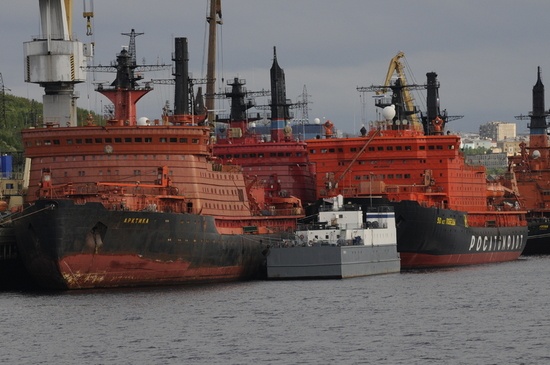 'Arctic Ice Breaker: Russia Leads America, 27-1.' Russia is so far ahead of the US in the Arctic, so the idea of a competition or a new race to conquer the Arctic simply doesn't exist, James Carden, executive editor at the American Committee for East-West Accord told RT. US Secretary of State John Kerry said the global race for Arctic's resources is already in action, and that "economic riches tend to attract military interest" in the region. RT News 'Arctic Ice Breaker: Russia Leads America, 27-1.' Russia is so far ahead of the US in the Arctic, so the idea of a competition or a new race to conquer the Arctic simply doesn't exist, James Carden, executive editor at the American Committee for East-West Accord told RT. US Secretary of State John Kerry said the global race for Arctic's resources is already in action, and that "economic riches tend to attract military interest" in the region. RT News
Plastic Trash Travels Up to Arctic Waters. Plastic trash has infiltrated the Arctic. Two new studies have spied bags, fishing rope and tinier bits of rubbish in the Barents Sea. This sea sits north of Norway, Sweden, Finland and Russia. It mixes with the Arctic Ocean, which is even farther north. "We often think that the filthy habits we have where we live don't go as far as the Arctic," says Erik van Sebille. He studies Earth's climate and oceans at Imperial College London in England. He was not involved in the new studies but says the data show the Arctic is no longer a vast, pristine wilderness. It is becoming trashy. This is not surprising, he says, but very disappointing. Student Science
|
Legislative Action
No Arctic legislation was formally considered yesterday.
|
|
Future Events
Arctic Observing Open Science Meeting, November 17-19, 2015 (Seattle, Washington). The Arctic Observing Open Science Meeting will be 2.5 days and held at the Hyatt at Olive 8 in Seattle, Washington. The conference will bring together individuals and teams involved in the collection, processing, analysis, and use of observations in the Arctic - from academia, agencies, industry, and other organizations. The meeting will be convened as a combination of plenary talks, parallel science sessions, and a poster session. The deadline for the Meeting Registration is Tuesday, 20 October. The agenda and registered attendees can be found on the meeting website.
**New this week** A Public-Private Partnerships and the Federal Arctic MTS, November 18, 2015 (Webinar). The goal of this webinar is to seek input from Arctic stakeholders engaged in or planning to engage in public-private partnerships (P3) to understand current types of partners and partnerships, planned activities, as well as success stories from previous partnerships. This information will be used to inform the recommendations for P3 partnerships in support of Arctic maritime infrastructure activities, as well as highlight examples of successful infrastructure initiatives achieved through P3 that may serve as examples for future initiatives in the U.S. Arctic.
**New this week** The Arctic Council at Twenty: Permanent Participants, Arctic Policy in Canada and the United States, and Stewardship. November 20, 2015, Seattle, WA (Workshop). This workshop - supported by the Korea Maritime Institute, and hosted by the Canadian Studies Center/Arctic and International Relations in the Henry M. Jackson School of International Studies - will reflect on the almost 20-year history of the Arctic Council, its influence on Arctic policy in North America, and future options concerning its role. Participants will present and discuss their reflections on the Arctic Council including its influence on Canadian and U.S. Arctic policy, and the role of four of the six Permanent Participant organizations who are represented in the Pacific Northwest. UW
In the Spirit of the Rovaniemi Process 2015, November 24-26, 2015 (Rovaniemi, Lapland, Finland).When the Arctic Environmental Protection Strategy, the so-called Rovaniemi Process, was adopted in 1991, it aimed at overcoming divisions and turning the zone of Cold War military tensions into a region of peace and co-operation. In this joint effort focusing on the protection of environment, and later, sustainable development, the Arctic states supported by indigenous organizations laid grounds for institutionalized collaboration and the emergence of Arctic regional identity. The second international conference will bring together decision-makers, scholars, artists, designers and students to address these questions and discuss the Arctic in global, regional and local perspectives.
Arctic Council and Beyond, December 4, 2015 (Ottawa, Ontario, Canada). This one-day conference hosted by The Northern Institute will focus on the role of the Arctic Council as a forum for Arctic cooperation, the place of the Arctic in Canada's foreign policy and approach to the circumpolar world, the role of the Arctic in global relations in light of the increasing interest in the region by European and Asian states, and the voice of Indigenous Peoples within the Arctic Council and in shaping circumpolar countries' Arctic policies.
Paris Arctic Climate Research Strategy Meeting, December 4, 2015 (Paris, France). The purpose of this facilitated discussion is to discuss future regional, national, and international funding opportunities for interdisciplinary Arctic climate research and develop concrete ideas for such research. All disciplines across humanities, social and natural sciences, art, health, technology and others as well as representatives of research, government, civil society, business and others are encouraged to attend.
Arctic Encounter Paris (AEP 2015), December 11-12, 2015 (Paris, France) (During the UN Convention on Climate Change - COP21). The Arctic Encounter Paris (AEP) will take place at the French Senate at Luxembourg Palace and the 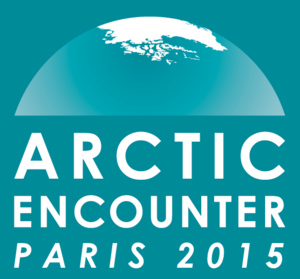 French Military College, École Militaire, in Paris, France, on the final days of the monumental United Nations Convention on Climate Change (COP21) where thousands of global citizens and government delegates will be gathered to deliberate the world's response to our changing planet in Paris. The AEP is the only Arctic policy and economics side event currently planned to take place during the UN Convention. A reception will take place following the closing panel. French Military College, École Militaire, in Paris, France, on the final days of the monumental United Nations Convention on Climate Change (COP21) where thousands of global citizens and government delegates will be gathered to deliberate the world's response to our changing planet in Paris. The AEP is the only Arctic policy and economics side event currently planned to take place during the UN Convention. A reception will take place following the closing panel.
 Fall meeting of the American Geophysical Union, December 14-18, 2015 (San Francisco, California). The 48th meeting of the union brings together nearly 24,000attendees, and lots of Arctic research results. The scientific program is here. There will be several Arctic-related "Town Hall" meetings, including those sponsored by NASA, DOE, NSF, ISAC, IARPC, and SEARCH. Fall meeting of the American Geophysical Union, December 14-18, 2015 (San Francisco, California). The 48th meeting of the union brings together nearly 24,000attendees, and lots of Arctic research results. The scientific program is here. There will be several Arctic-related "Town Hall" meetings, including those sponsored by NASA, DOE, NSF, ISAC, IARPC, and SEARCH.
This symposium is part of an ongoing initiative of the National Academies of Science Polar Research Board to expand public understanding of why the dramatic changes affecting the Arctic region ultimately matter to us all. The agenda features engaging presentations and discussions with top Arctic science and policy experts, and displays and interactive exhibits that illustrate Arctic change and its global impacts. The event is free and open to the public. There are sponsorship opportunities, and a call for exhibitor applications (by Oct.31, 2015). Audience space is limited, so register today; and please encourage your friends, neighbors, and colleagues to participate-as our goal is to reach well beyond the small circle of specialists who typically attend Arctic-themed events in the DC area. The U.S. Arctic Research Commission is helping to sponsor this event.
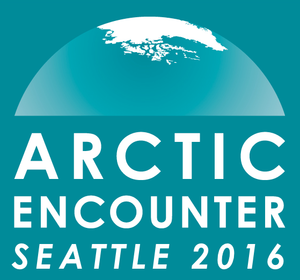 Building upon the preceding Arctic Encounter event in Paris, the third annual Arctic Encounter Symposium (AES) in Seattle, Washington will convene policymakers, industry leaders, and leading experts to confront the leading issues in Arctic policy, innovation, and development. As the largest annual Arctic policy event in the United States, the AES mission is to raise awareness, engage challenges, and develop solutions for the future of a region and a people. The two-day program includes two keynote luncheons, expert plenary sessions, break out sessions, a networking cocktail reception and seated dinner. A closing reception will take place at the conclusion of the program. Building upon the preceding Arctic Encounter event in Paris, the third annual Arctic Encounter Symposium (AES) in Seattle, Washington will convene policymakers, industry leaders, and leading experts to confront the leading issues in Arctic policy, innovation, and development. As the largest annual Arctic policy event in the United States, the AES mission is to raise awareness, engage challenges, and develop solutions for the future of a region and a people. The two-day program includes two keynote luncheons, expert plenary sessions, break out sessions, a networking cocktail reception and seated dinner. A closing reception will take place at the conclusion of the program.
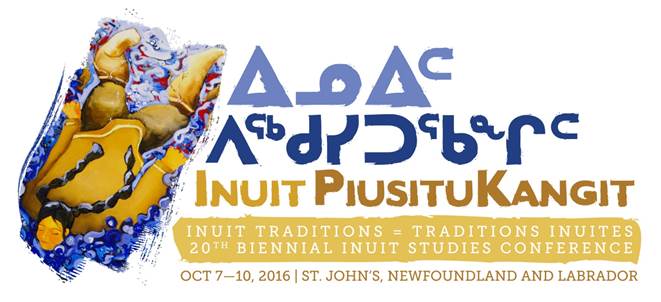 Inuit traditions are a repository of Inuit culture and a primary expression of Inuit identity. The theme for the 2016 Inuit Studies Conference invites Elders, knowledge-bearers, researchers, artists, policy-makers, students and others to engage in conversations about the many ways in which traditions shape understanding, while registering social and cultural change. The institutional hosts of "Inuit Traditions," Memorial University of Newfoundland and the Nunatsiavut Government, invite you to contribute to an exchange of knowledge to be held in St. John's, Newfoundland and Labrador, October 7-10, 2016. Presentations on all aspects of Inuit studies will be welcome. Inuit traditions are a repository of Inuit culture and a primary expression of Inuit identity. The theme for the 2016 Inuit Studies Conference invites Elders, knowledge-bearers, researchers, artists, policy-makers, students and others to engage in conversations about the many ways in which traditions shape understanding, while registering social and cultural change. The institutional hosts of "Inuit Traditions," Memorial University of Newfoundland and the Nunatsiavut Government, invite you to contribute to an exchange of knowledge to be held in St. John's, Newfoundland and Labrador, October 7-10, 2016. Presentations on all aspects of Inuit studies will be welcome.
|
|

  
4350 N. Fairfax Drive, Suite 510
Arlington, VA 22203, USA
External links in this publication, and on the USARC's World Wide Web site ( www.arctic.gov) do not constitute endorsement by the US Arctic Research Commission of external Web sites or the information, products or services contained therein. For other than authorized activities, the USARC does not exercise any editorial control over the information you may find at these locations. These links are provided consistent with the stated purpose of this newsletter and the USARC Web site.
|
|
|
|
|
|
|
|
|